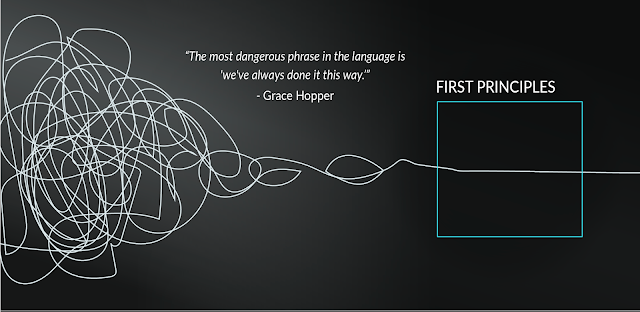Unveiling Life's Truths Through First Principles: Philosophy, Career, and Beyond
From wikipedia, In philosophy and science, a first principle is a basic proposition or assumption that cannot be deduced from any other proposition or assumption. First principles in philosophy are from first cause[1] attitudes and taught by Aristotelians, and nuanced versions of first principles are referred to as postulates by Kantians.[2]
As per French Philosopher Descartes; It says philosophy is the study of wisdom and knowledge, including how to live well and learn different skills. To understand philosophy, you start with really clear and obvious basic ideas called "principles." Other knowledge depends on these principles, and you build your understanding from there. The goal is to connect everything you learn, from simple principles to more complex ideas.
First Principle in life
Question assumptions
Ask yourself if the way you're doing things is the best way. Just because everyone does it a certain way doesn't mean it's the only way. For instance, if you're always rushing in the morning, ask if there's a better way to organize your routine.
Example: Questioning inequality
Let's say there's a tradition in a community where only men are allowed to pursue certain careers while women are expected to stay home. Someone applying first principles thinking might question this assumption by asking why gender should determine a person's career choices. They might explore whether talents, skills, and interests are linked to gender or if there's a better way to ensure fairness and opportunities for everyone, regardless of gender. By questioning this tradition, they are challenging assumptions and seeking a more rational and just perspective based on the fundamental principle of equality and individual capabilities. This process could potentially lead to positive changes in how society views and supports career choices for all its members.
Example: Questioning medium of building a career
Imagine there's a common belief that everyone should pursue a college degree and work in a corporate job to be considered successful. Applying first principles thinking, someone might question whether a college degree and a traditional office job are the only paths to success. They might break down the idea of success and consider what skills, experiences, and fulfillment truly matter.
Certainly, let's explore the perspective of not having a traditional career path using the first principle of individual autonomy and fulfillment.
Example: Questioning career
Not having a traditional career can be justified by valuing individual autonomy and seeking personal fulfillment over societal norms. This principle suggests that each person should have the freedom to choose how they spend their time and pursue their passions in ways that align with their values and desires.
By not adhering to a traditional career, individuals have the opportunity to explore diverse interests, engage in creative pursuits, and lead a life centered around experiences that bring them joy and fulfillment. This might involve pursuing hobbies, traveling, volunteering, or dedicating time to personal projects.
Furthermore, not having a career can reduce the pressure to conform to societal expectations and the stress that often accompanies traditional job roles. This approach prioritizes mental and emotional well-being over the pursuit of a structured career.
In summary, the choice not to have a career aligns with the first principle of individual autonomy and fulfillment, allowing individuals to lead a life that is personally meaningful and in harmony with their own aspirations and values.
First Principle in business
Elon Musk is a prominent businessman who often adheres to the first principles approach. He's known for breaking down complex problems into fundamental elements and reevaluating established norms. For example, when developing SpaceX's reusable rockets, he questioned the conventional aerospace industry's high costs by analyzing the underlying physics and materials. This approach led to innovative solutions and cost reductions. Similarly, in creating Tesla's electric vehicles, Musk challenged assumptions about battery technology and manufacturing processes, leading to advancements in the electric car industry. His emphasis on first principles thinking has contributed to his success in multiple ventures.
Jeff Bezos of Amazon emphasizes focusing on the core components of a problem to find unique solutions. Google's co-founders, Larry Page and Sergey Brin, applied first principles thinking in developing the PageRank algorithm. Reid Hoffman, co-founder of LinkedIn, encourages entrepreneurs to challenge assumptions and embrace creative solutions. While not explicitly discussed as "first principles," Warren Buffett's investment philosophy aligns with the idea of understanding fundamental business principles. These individuals showcase the power of questioning assumptions and applying fundamental analysis to drive innovation and success in business.
Conclusion
In summary, embracing the practice of questioning assumptions through first principles thinking can bring transformative change to our lives. By challenging the "why" behind our routines, roles, and choices, we open doors to new perspectives and opportunities. As a practical takeaway, consider incorporating a daily habit of reflection. Take a moment each day to question one assumption you've held, whether it's about your routine, your beliefs, or your goals. By cultivating this habit, you'll gradually uncover more authentic paths, aligning your actions with your true values and aspirations. This simple yet profound shift in mindset can lead to a life filled with purpose, growth, and the fulfillment that comes from living authentically. Next time when you are confused in making decisions in life or business, think of first principal. Cut through the noise.




Comments
Post a Comment